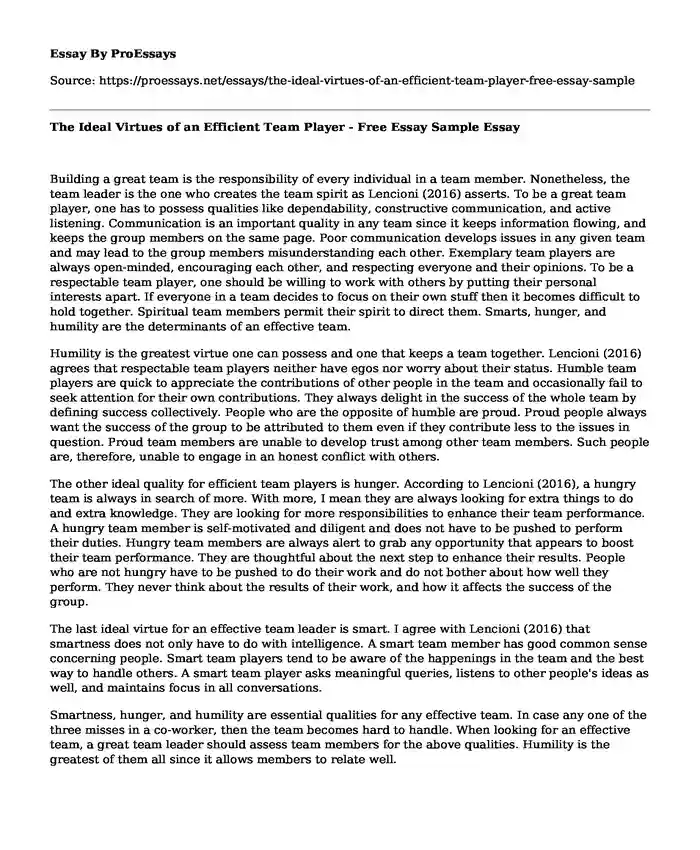Building a great team is the responsibility of every individual in a team member. Nonetheless, the team leader is the one who creates the team spirit as Lencioni (2016) asserts. To be a great team player, one has to possess qualities like dependability, constructive communication, and active listening. Communication is an important quality in any team since it keeps information flowing, and keeps the group members on the same page. Poor communication develops issues in any given team and may lead to the group members misunderstanding each other. Exemplary team players are always open-minded, encouraging each other, and respecting everyone and their opinions. To be a respectable team player, one should be willing to work with others by putting their personal interests apart. If everyone in a team decides to focus on their own stuff then it becomes difficult to hold together. Spiritual team members permit their spirit to direct them. Smarts, hunger, and humility are the determinants of an effective team.
Humility is the greatest virtue one can possess and one that keeps a team together. Lencioni (2016) agrees that respectable team players neither have egos nor worry about their status. Humble team players are quick to appreciate the contributions of other people in the team and occasionally fail to seek attention for their own contributions. They always delight in the success of the whole team by defining success collectively. People who are the opposite of humble are proud. Proud people always want the success of the group to be attributed to them even if they contribute less to the issues in question. Proud team members are unable to develop trust among other team members. Such people are, therefore, unable to engage in an honest conflict with others.
The other ideal quality for efficient team players is hunger. According to Lencioni (2016), a hungry team is always in search of more. With more, I mean they are always looking for extra things to do and extra knowledge. They are looking for more responsibilities to enhance their team performance. A hungry team member is self-motivated and diligent and does not have to be pushed to perform their duties. Hungry team members are always alert to grab any opportunity that appears to boost their team performance. They are thoughtful about the next step to enhance their results. People who are not hungry have to be pushed to do their work and do not bother about how well they perform. They never think about the results of their work, and how it affects the success of the group.
The last ideal virtue for an effective team leader is smart. I agree with Lencioni (2016) that smartness does not only have to do with intelligence. A smart team member has good common sense concerning people. Smart team players tend to be aware of the happenings in the team and the best way to handle others. A smart team player asks meaningful queries, listens to other people's ideas as well, and maintains focus in all conversations.
Smartness, hunger, and humility are essential qualities for any effective team. In case any one of the three misses in a co-worker, then the team becomes hard to handle. When looking for an effective team, a great team leader should assess team members for the above qualities. Humility is the greatest of them all since it allows members to relate well.
References
Lencioni, P.M. (2016). Ideal team player: How to recognize and cultivate the three essential virtues. Hoboken: Jossey-Bass.
Cite this page
The Ideal Virtues of an Efficient Team Player - Free Essay Sample. (2023, Dec 17). Retrieved from https://proessays.net/essays/the-ideal-virtues-of-an-efficient-team-player-free-essay-sample
If you are the original author of this essay and no longer wish to have it published on the ProEssays website, please click below to request its removal:
- Religion, Culture, Community Essay
- Paper Example on Principled Negotiation
- Knowledge of Intercultural Communication Essay
- Essay on KFC's Expansion in China: A Risky Yet Rewarding Opportunity
- Exploring Link Between Security, Safety, & Wellbeing: Annotated Bibliography
- Essay Example on Interpersonal, Verbal & Written Communication: Strengthening Relationships
- Free Essay Sample on Same-Sex Marriage in the US







